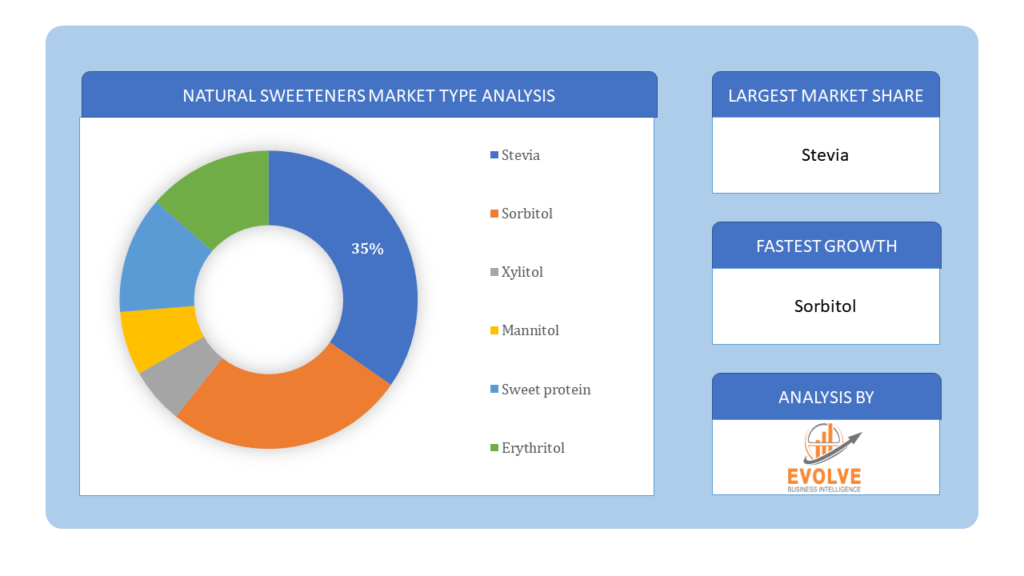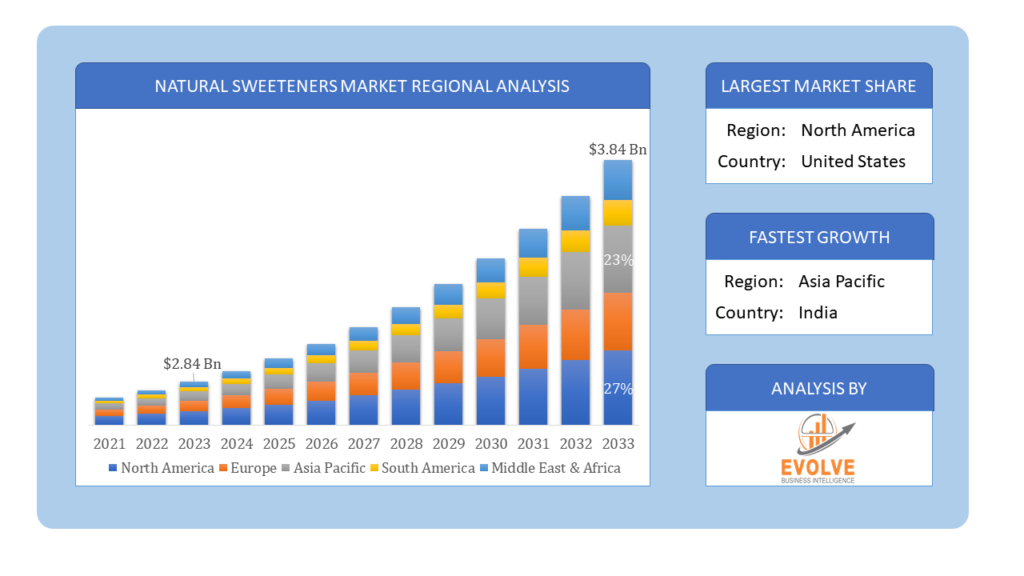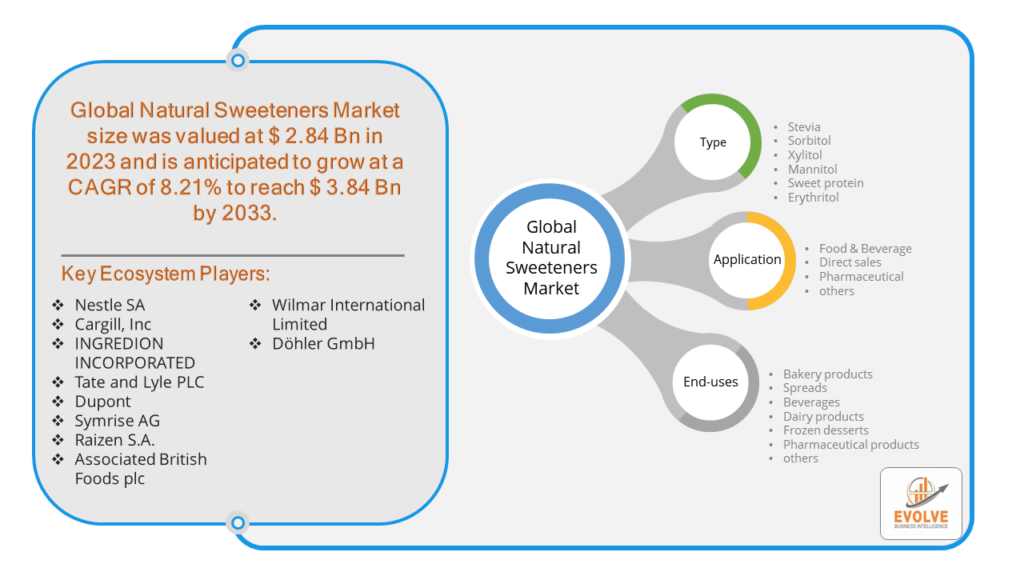Natural Sweeteners Market Overview
The Natural Sweeteners Market Size is expected to reach USD 3.84 Billion by 2033. The Natural Sweeteners industry size accounted for USD 2.84 Billion in 2023 and is expected to expand at a compound annual growth rate (CAGR) of 8.21% from 2023 to 2033. Natural sweeteners are ingredients that provide a sweet taste in food and beverages. They are widely used as a substitute for artificial sweeteners and are also broadly used by the geriatric population and aging, especially when they are following bodybuilding and diets. Unlike nonnutritive sweeteners, natural sweeteners contain calories and nutrients, and are metabolized, and modified as they pass through the body. They include agave nectar, brown rice syrup, honey, maple syrup, molasses, date sugar, blackstrap molasses, sorghum syrup, and stevia.
Global Natural Sweeteners Market Synopsis
The global natural sweeteners market is impacted extremely due to the uncertain pandemic that occurred across the globe. The effects of COVID-19 impacted the supply chain of the end products, as well as raw material components. The North American region, followed by the Asia Pacific and the Europe region, plays a dynamic role in the natural sweeteners market due to the attentiveness of several key players operating from these regions. Hence, the market in terms of supply is anticipated to witness hindrances. However, regional consumption is predicted to witness a surge in the respective market itself, as consumers are increasingly focused on maintaining weight and following different diets for maintaining good health. All these factors are projected to drive the demand for natural sweeteners.
Global Natural Sweeteners Market Dynamics
The major factors that have impacted the growth of Natural Sweeteners are as follows:
Drivers:
- Rising the Awareness for Healthy Food and Beverage
Owing to the new product launches and rising awareness regarding preventive healthcare substitutes, consumers are progressively getting aware of their nutritional needs. Hence, with rising health consciousness, consumers are now shifting towards healthier choices concerning the consumption of various food & beverage products. Recent consumer trends include a demand for reduced sugar, low-calorie, and all-natural & organic ingredient-based products, owing to the several health benefits offered and growing incidences of chronic diseases across the globe as a result of unhealthier dietary routines.
Restraint:
- The high price of Natural Sweeteners
The raw materials essential for the production of artificial sweeteners can e easily procured as compared to that natural sweeteners. The costs of these natural raw materials are generally more than the chemicals required to manufacture artificial sweeteners. Also, the processing of artificial sweeteners consumes minor effort and time than that of natural sweeteners. Natural sweeteners have to undergo several tests and trials and labeling norms and rules to be labeled as natural sweeteners. All these factors acquisitively add up to the costs of production, ultimately foremost to add up in the cost price. Thus, natural sweeteners are the finest priced as compared to artificial sweeteners. This may possess a challenge to the growth of the natural sweeteners market.
Opportunity:
- Increasing Research and Development activities
The positive research and developments in the sweetener market for the production of harmless and better products to cater to the growing demand of consumers for safe, health-benefiting products would generate a huge growth opportunity for the sweeteners market, and Researchers are coming up with new ranges of natural sweetener products to meet the rising need of consumers for health-promoting goods.
Natural Sweeteners Market Segment Overview
By Type
 Based on the type, the natural sweeteners market is segmented based on Stevia, Sorbitol, Xylitol, Mannitol, Sweet protein, and Erythritol. The stevia segment is expected to witness the fastest-growing market share during the forecast period. The sweet-tasting component of stevia is called steviol glycosides, which are indeed present in th stevia leaf. There are eleven key steviol glycosides present in stevia. These are the sweet components isolated and purified from the leaves of stevia. Additionally, stevia sweeteners do not include carbohydrates or calories in food and beverage.
Based on the type, the natural sweeteners market is segmented based on Stevia, Sorbitol, Xylitol, Mannitol, Sweet protein, and Erythritol. The stevia segment is expected to witness the fastest-growing market share during the forecast period. The sweet-tasting component of stevia is called steviol glycosides, which are indeed present in th stevia leaf. There are eleven key steviol glycosides present in stevia. These are the sweet components isolated and purified from the leaves of stevia. Additionally, stevia sweeteners do not include carbohydrates or calories in food and beverage.
By Application
Based on the end-use sector, the natural sweeteners are segmented based on food & beverage, Direct sales, Pharmaceutical, and others. The food & beverage segment is anticipated to generate the major revenue share during the forecast years due to being largely used as sweetening agents in various food & beverage products, such as baked foods, fruit juices, and various confectionery products.
By End-uses
Based on the application, the natural sweeteners are segmented based on Bakery products, Spreads, Beverages, Dairy products, Frozen desserts, Pharmaceutical products, and others. The Beverage segment accounted for a major share of the global natural sweeteners market. Due to the use of sweetness in beverage products such as soft drinks, ready-to-drink, flavored water, and fruit juices.
Global Natural Sweeteners Market Regional Analysis
Based on region, the market has been divided into North America, Europe, Asia-Pacific, the Middle East & Africa, and Latin America. The area of North America is anticipated to dominate the market for the usage of Natural Sweeteners , followed by those in Asia-Pacific and Europe.
 Natural Sweeteners North America Market
Natural Sweeteners North America Market
Based on region, North America is projected to expand at a CAGR of 2.4% from 2022 to 2030. Several regional players are offering low-calorie food & beverages due to the increasing health consciousness among consumers. Moreover, the rising awareness about sugar alternatives that provide low or no calories is contributing to the growth of the market in North America. Europe holds the second-largest market share for natural sweeteners. The demand for sweeteners in this region will be driven by the widespread usage of sweeteners in alcoholic beverages.
Natural Sweeteners Asia Pacific Market
Asia Pacific is expected to have the highest CAGR over the forecast period owing to the exponentially increasing demand for natural sweeteners in the preparation of Asian food products, such as pastes, sauces, pickles, and others. Increasing the aging population and the inclination of consumers towards a healthy lifestyle is also anticipated to play a significant role in enhancing the growth of the natural sweeteners market of the region. The rising focus of consumers in countries like China, India, and Japan to stay fit and strong is also propelling the APAC regional market growth.
Competitive Landscape
The competitive landscape includes key players (tier 1, tier 2, and local) having a presence across the globe. Companies such as Nestle SA, Cargill, Inc, INGREDION INCORPORATED, Tate and Lyle PLC, and Dupont are some of the leading players in the global Natural Sweeteners Industry. These players have adopted partnership, acquisition, expansion, and new product development, among others as their key strategies.
Key Market Players:
- Nestle SA
- Cargill, Inc
- INGREDION INCORPORATED
- Tate and Lyle PLC
- Dupont
- Symrise AG
- Raizen S.A.
- Associated British Foods plc
- Wilmar International Limited
- Döhler GmbH
Key development:
In May 2021, Ingredion Incorporated has made a research & development alliance with Amyris for the development of sustainably sourced, nature-based sweeteners, zero-calorie, and potentially other types of fermentation-based food ingredients.
In June 2020, Sweegen declared its successful commercial production of Reb B (Bestevia Rebaudiosides). It is an extremely soluble stevia sweetener providing a good presentation in a range of applications, especially beverages.
Scope of the Report
Global Natural Sweeteners Market, by Type
- Stevia
- Sorbitol
- Xylitol
- Mannitol
- Sweet protein
- Erythritol
Global Natural Sweeteners Market, by Application
- Food & Beverage
- Direct sales
- Pharmaceutical
- others
Global Natural Sweeteners Market, by End-uses
- Bakery products
- Spreads
- Beverages
- Dairy products
- Frozen desserts
- Pharmaceutical products
- others
Global Natural Sweeteners Market, by Region
- North America
- US
- Canada
- Mexico
- Europe
- UK
- Germany
- France
- Italy
- Spain
- Benelux
- Nordic
- Rest of Europe
- Asia Pacific
- China
- Japan
- South Korea
- Indonesia
- Austalia
- Malaysia
- India
- Rest of Asia Pacific
- South America
- Brazil
- Argentina
- Rest of South America
- Middle East & Africa
- Saudi Arabia
- UAE
- Egypt
- South Africa
- Rest of Middle East & Africa
| Parameters | Indicators |
|---|---|
| Market Size | 2033: $3.84 Billion |
| CAGR | 8.21% CAGR (2023-2033) |
| Base year | 2022 |
| Forecast Period | 2023-2033 |
| Historical Data | 2021 |
| Report Coverage | Revenue Forecast, Competitive Landscape, Growth Factors, and Trends |
| Key Segmentations | Type, Application, End-uses |
| Geographies Covered | North America, Europe, Asia-Pacific, Latin America, Middle East, Africa |
| Key Vendors | Nestle SA, Cargill, Inc, INGREDION INCORPORATED, Tate and Lyle PLC, Dupont, Symrise AG, Raizen S.A., Associated British Foods plc, Wilmar International Limited, Döhler GmbH. |
| Key Market Opportunities | • Increasing Research and Development activities |
| Key Market Drivers | • Rising the Awareness for Healthy Food and Beverage |
REPORT CONTENT BRIEF:
- High-level analysis of the current and future Natural Sweeteners Industry trends and opportunities
- Detailed analysis of current market drivers, restraining factors, and opportunities analysis in the future
- Historical market size for the year 2021, and forecast from 2023 to 2033
- Natural Sweeteners market share analysis for each segment
- Competitor analysis with a comprehensive insight into its product segment, financial strength, and strategies adopted.
- Identifies key strategies adopted by the key players including new product development, mergers and acquisitions, joint ventures, collaborations, and partnerships.
- To identify and understand the various factors involved in the global Natural Sweeteners market affected by the pandemic
- To provide year-on-year growth from 2022 to 2033
- To provide short-term, long-term, and overall CAGR comparison from 2022 to 2033.
- Provide Total Addressable Market (TAM) for the Global Natural Sweeteners Market.





